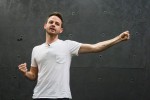Tim Lewis was aware he had feelings for the same sex throughout his restrictively religious upbringing, but in order to hide that part of himself from others, he decided to attend a Christian college.
His time spent studying for his undergraduate degree reinvigorated his faith and he came to a new understanding of his identity and sexuality through his independent studies, some of which were on the Bible, he said.
Lewis graduated with a master’s degree in producing from the UCLA School of Theater, Film and Television in 2015. He will perform a one-man play Thursday based around his experience and re-examination of being both a Christian and gay individual. He will showcase the piece at the event space of ENDPAIN, a network that fosters stories based around human healing. The proceeds will benefit the Trevor Project, a national 24-hour suicide hotline for gay youth.
Lewis said he hopes presenting his viewpoint will allow playgoers to leave with a new understanding of what faith and Christianity means, and how faith is not necessarily one-fits-all.
Lewis describes the play as part one-man show, part TED Talk and part sermon. In the play, Lewis reinterprets what it means to be a Christian through his process of coming out and examining how Christianity and homosexuality intersect. He uses mediums such as biblical historical retellings and reflections on his own experience.
Lewis grew up in a small town in upstate New York in a conservative religious group that believed everyone was born a sinner, he said. Lewis was also starting to develop feelings for members of the same sex.
“I was being taught these things about faith, and I felt a deep connection to something spiritual – something sort of divine – but I knew that there was this thing that was happening inside of me biologically,” Lewis said. “I essentially spent many, many years at war with myself.”
Lewis had been writing about his life story in many different mediums for several years. While working on his master’s degree in producing at UCLA from 2013 to 2015, he worked on developing a TV series – a fictionalized narrative based on his life story thus far, but he left it alone after finishing the program.
Lewis started writing for ENDPAIN in June to write about pain healing.
He shared his writing about his experience being both gay and Christian with his personal friend, Quinn Marcus, who wanted to direct his story into a performance piece. Marcus helped give form to some of Lewis’ ideas and Lewis continued to write more for the script about the struggles of his inner conflict and what faith means to him.
Marcus, who identifies as Jewish and lesbian, met Lewis on set of a web series from a UCLA student group during his master’s program. The pair connected instantly. They also live together, which allowed more time for developing the play. The content of the play came from Lewis, but the format is a personal combination of their ideas and styles, she said.
Lewis shared the idea for the play with ENDPAIN. The organization’s founder, Alison Hersel, planned to make Lewis’ story into a one-night performance and fundraiser for the Trevor Project. Hersel said she wanted to produce Lewis’ play because she was inspired by how he reinterpreted the meaning behind ideas such as eternity and sin.
“Ultimately he chooses to embrace the idea that eternity is something that is possible in life and that it is the feeling of freedom rather than a goal to strive towards for the afterlife,” Hersel said.
Being both a Christian and a member of the gay community has been isolating due to polarity between the two groups, Lewis said.
“There’s a real opportunity for us to re-examine what it means to call ourselves Christians, to call ourselves gay, to call ourselves all sorts of things, to examine these labels and what it’s like to turn them all on their heads,” he said.
He hopes the audience of his show will find a new understanding for what it means to be Christian and gay, and they see the two aspects of society as compatible.
“I really hope to start a dialogue on faith and sexuality that sort of mirrors my own experience,” Lewis said.
